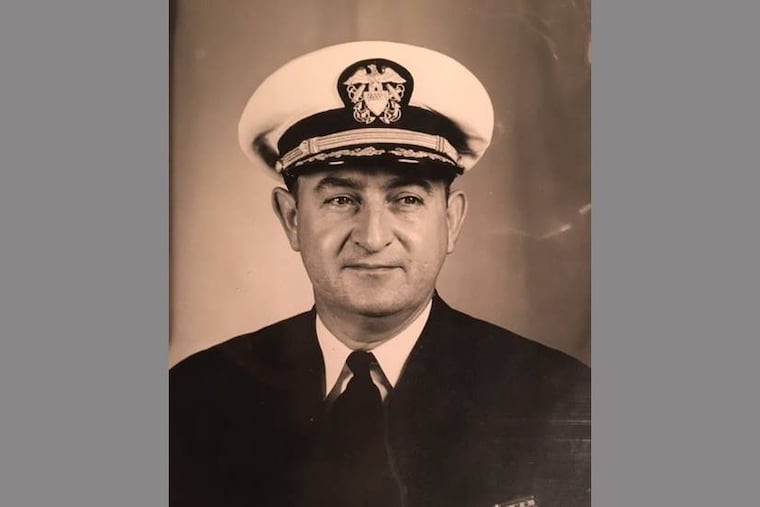The Philly sports fan who became a WWII hero | Frank's Place
"Father Foxhole" stormed the beaches with the Marines during some of World War II's bloodiest battles - Tarawa, Guadalcanal and Iwo Jima.

The cassock and collar he wore most of his life didn't exclude Msgr. Francis W. Kelly from the proud breed known as Philadelphia sports fans.
Raised near 38th and Aspen in West Philly's old Corktown neighborhood, the garrulous, twinkly-eyed, and opinionated priest was passionate about the Phillies and Eagles and West Catholic football before and after his 1937 ordination.
Ed Maher, who met Kelly as an altar boy at Drexel Hill's St. Charles parish and remained a friend throughout his life, recalled that the cleric also loved golf. At courses such as Springfield Country Club and Secane Golf Club, he displayed a game that was both spirited and decidedly unreligious.
"He liked to improve his lie," Maher, 89, said last week.
Kelly became so well-known in the city's sports community that when Veterans Stadium opened in 1971, he was asked to perform the blessing and dedication. He did so, six days before it officially debuted with a Phillies-Expos game, from a platform between third base and home plate. And then, not surprisingly, he spent several hours socializing with Eagles and Phillies officials.
His sacred vows didn't stop Kelly from displaying the impetuosity that brands this city's fans.
Once, driving back from a West Catholic football game with Maher and another friend on a bright December Sunday in 1941, Kelly switched on the car's radio.
"Every station was describing the sneak attack on Pearl Harbor," Maher said. "Father Kelly slammed the dashboard and declared he was going to enlist."
Within weeks, he was in uniform, a Navy chaplain assigned to the First and Second Marine Divisions. His temperament, honed by that love of competition, propelled Kelly toward the action. In time, fighting Marines grew so used to seeing him they dubbed him "Father Foxhole."
"He would insist," Kelly's New York Times obituary noted, "on front-line duty."
"Father Foxhole" stormed the beaches with the Marines during some of World War II's bloodiest battles – Tarawa, Guadalcanal, and Iwo Jima. Then, following a brief leave in his hometown, he returned to the Pacific in time for the Okinawa assault, which left 12,500 Marines dead.
In 1950, Kelly reenlisted and went to Korea. And 21 years later, at 61, he left his Center City parish to minister to those fighting in Vietnam.
Injured by shrapnel on Tarawa, Kelly was awarded the Purple Heart. John Leopold, another wounded veteran of that bloody Pacific fight, later described the chaplain as "a wonderful guy … a real man … fearless."
His other service honors included a Legion of Merit medal and a Presidential Unit Citation. And the popular Philadelphia priest was portrayed in Guadalcanal Diary, both the best-selling book and the 1943 film it inspired.
Kelly, named a monsignor in 1969, served at a number of area parishes, including St. Charles, Center City's St. Patrick's, Chester's St. Robert's, and St. Helena's in North Philadelphia. But he reacted like a dog to a whistle whenever he heard the din of war.
He reenlisted for the Korean conflict in 1950, and in 1971 asked to be relieved of duties at St. Patrick's to return to Camp Pendleton, the California Marine base that served as a military pipeline to Vietnam.
"After serving the Marines so long, he found that parish life was not for him," Maher said.
It was at Tarawa, a battle one writer described as "four of the worst days in the history of human-kind," that Kelly earned his reputation. Though the priest never forgot the brutality of that November 1943 combat, the image that stuck with him was of a religious service he conducted the night before the Marine landing.
"[The Marines] gathered in the dimly lit ship's mess, stripped to the waist and perspiring in the tropical heat," he told the Daily News' Nels Nelson in 1967. "There was a Protestant kid playing the organ. They received Holy Communion knowing the next day a lot of them were not going to be alive.
"It ended with `Holy God We Praise Thy Name.' I told them a hymn was a prayer set to music, so let's give it the works. Never before or since have I heard a hymn sung with such volume and fervor."
The next day, when the chaplain charged out of his landing craft, the beach was littered with Marine casualties. Kelly ministered to the most seriously wounded.
"But there were so many dead by then, we had to begin to dig a cemetery," Kelly remembered.
The first Marine he interred was a close friend, Lt. Col. Herbert Amey of Ambler, who had been shot through the throat.
Kelly spent the final decade of his life where he wanted to be. Retired to California so he could be close to Camp Pendleton's Marines, he continued to minister to the men and to train the chaplains who would serve them. He died at a hospital near there at 71 in January 1982.
His body was returned to his hometown, where Cardinal Krol presided over a Jan. 15 funeral Mass at the Cathedral Basilica of SS. Peter and Paul.
Then, for a last time, Kelly departed Philadelphia to be with his men. They rendezvoused on a knoll at Arlington National Cemetery, where in Section 2: Site E-226-B1, Kelly finally found peace.